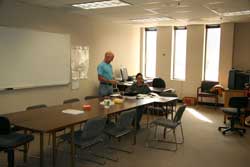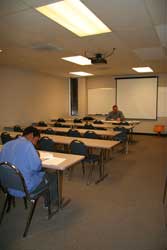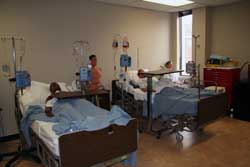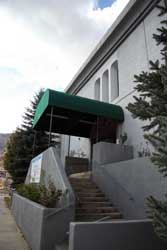The Commons: One stop learning where learning never stops







One building providing an umbrella for educational, career, technical, environmental conservation and family support services – who would have thought?
DURANGO, Colo. – One evening Paulette Church, director of the Durango Adult Education Center, was heading along West 7th Street toward Camino del Rio, and it hit her.
“I thought, ‘We could fit there,’” she said.
Sitting directly ahead of her was the behemoth 701 Camino del Rio, more commonly known as “the Federal Building,” and it sported a giant “For Sale” sign. Church drove around the building, eyeing the possibilities with a guarded optimism. Instinctively she knew it could be the solution that so many educational entities and non-profits in town had been seeking.
Today “The Commons,” as 701 Camino is now called, stands as an example of what enterprising and forward-thinking Durangoans can accomplish. Unique in the United States, The Commons holds a full continuum of services, with educational, career, technical, environmental conservation and family support assistance under one roof. It is owned and operated by a new non-profit organization, Southwest Institute for Education and Conservation (SIEC), which is a blending of representatives from the Adult Education Center and Southwest Conservation Corps, plus input from Pueblo Community College.
The Commons was about seven years in the making. According to Church, non-profits in the region had been philosophically discussing co-location for cost savings as well as community convenience. At the same time, independently, the educational entities in the community were grappling with the need for more space to meet community demand, tenuous leases in their current locations, or both.
“About two years ago a core group came together,” said Church, referencing the Adult Education Center, San Juan Technical College, Pueblo Community College, the Southwest Conservation Corps and more. “And we went to city council after the hospital sold its land to the city and said we’d like to be able to use a spot of land in that eight acres. We’d raise the funds and build the building.”
But the council wasn’t ready to make the land-use decision. The partners continued their search to no avail – until the fateful night that Church spied the For Sale sign.
Due diligence on the 45,000 sq. ft. building followed, as well as fund raising and loan negotiation. SIEC was able to purchase the building from Jean-Pierre Bleger for the assessed value, $4,895,000, and Bleger returned $400,000 to SIEC, bringing the total initial outlay down to under $4.5 million. Currently SIEC is investing an additional $3 million in improvements.
“We’ve been pre-approved for a USDA loan,” said Church. “And that’s a very favorable loan that the rent we generate from the organizations leasing space in the building will cover, as well as the operating costs of the building.”
Pueblo Community College (PCC), which by charter must lease space not own, is the largest tenant and fills the second floor and part of the first. The University of Denver (DU) Graduate School of Social Work utilizes some of
PCC’s space to offer its distance-learning program in the region.
“We have recently, in partnership with PCC, upgraded one of the classrooms with a new, fast polycom system to Denver and can co-share technology when it is needed,” said Wanda Ellingson, DU’s distance education director in the Four Corners. “We hope to partner with Adult Ed in the use of other shared services, student lounge, child care, etc.”
“We will have pre-school and infant/toddler child care rooms,” confirmed Church, noting the drop-in day care will include an outdoor play yard. “Plus we’re adding a shared, fully-equipped conference room that will be available to the public, and a ‘gathering space,’ which is like a student lounge. We wanted a place for people – whether they’re at DU and working on a master’s degree, or working on their GED with us, or they’re at PCC – to get together and encourage continuing education.”
Fort Lewis College will also have a satellite admissions, testing and financial aid office to ease transition into the four-year undergraduate institution. Additional tenants in the building, such as Alternative Horizons, Alzheimer’s Association, Sexual Assault Services Association and San Juan Basin Area Agency on Agency provide support services for all ages.
“Through a grant from San Juan Basin Heath, the Southwest Smiles Dental Clinic will also be here,” said Church of the clinic for both adults and children. “Once we get the clinic in and going, then we’ll have some conversations: should we add a dental hygienist program to PCC, and how might it look? These are the kinds of synergies that are happening. We identify a community need and then figure out how those of us in the building can come together and make it happen.”
Going forward, Church hopes other community organizations will take advantage of The Commons for training and education. Possibilities include EMT training, alleviating the need to travel to Farmington; technical training for building trades; and training and testing for a commercial driver’s license.
“We hope to continue to create new and innovative partnerships with our ‘Commons’ colleagues as well as the Four Corners community,” said Ellingson. “Our students see this as an exciting place to have their education delivered and, as they say, ‘There is really good energy in the building now!’.”
The Commons has met 92 percent of the capital campaign funding needs thanks to the generosity of the Durango community, plus significant grants such as a Community Development Block Grant for $525,000, which funded renovation for the Adult Education Center and Conservation Corps office spaces.
As an Enterprise Zone, donors supporting The Commons can receive a Colorado tax credit of 25 percent. However, noted Church, if donors contribute specifically to the child care center renovation they receive a 50 percent state tax credit.
“We calculated it out,” said Church. “For the average taxpayer, if they were to donate $10,000 to the child care center, their actual out-of-pocket would be $2,100 because of all the credits that come back to them.”
Though exterior renovations will not be started until spring, a building-wide “open house” is anticipated for late November to showcase the new interiors and variety of services within the concrete walls of The Commons.
Said Church, “We want people to come in and say (with delight), ‘Oh, these are the facilities that are available.’ It’s pretty exciting.”
To follow the progress or learn more about The Commons, visit www.durangocommons.org.
